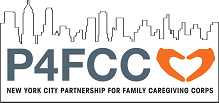"Family caregiving directly affects corporate earnings, but there is help."
Caregiving is a challenge for most full-time workers, affecting productivity, retention and your bottom line. What strategies are available to companies that care?
Principles For Corporate Socially Responsible Family Caregiver Programs
According to an AARP study released in August 2015, in 2013 there were about 40 million family caregivers in the United States providing an estimated 37 billion hours of care to an adult with limitations in daily activities. The estimated economic value of their unpaid contributions was approximately $470 billion in 2013, up from an estimated $450 billion in 2009.
In New York State alone there are 2.2 million family caregivers and this number is expected to increase exponentially as the baby boomer population doubles by 2030. Today, seven out of 10 family caregivers work full or part time and represent more than 15 percent of the U.S. work force. As a result, the annual cost to corporations for family caregiving related issues amounts to losses of between $17 — $34 billion. This is due in part to caregiving responsibilities of employees that lead to absenteeism, workday interruptions, reduced productivity, turnover and the resulting costs of training new hires, increased supervisory involvement and even accidents on the job.
The New York City Partnership for Family Caregiving Corps was established by EmblemHealth and includes nonprofit organizations with extensive expertise providing services, resources and information for family caregivers. Its purpose is to help businesses and their employees reduce the impact on productivity due to family caregiving issues.
Companies have invested time and energy into reputation management and identifying ways to attract quality talent and we believe these principles will be a key component of those efforts. Many have devised policies and practices that address family caregiver needs. It is our hope that more of corporate America will embrace these principles as more and more of us become family caregivers.
We are deeply grateful to the members of the Corporate Leadership Council for developing these principles and look forward to the corporations who join with us in embracing them.
Karen Ignagni
President and CEO
EmblemHealth
Principles
-Recognize that the organization has family caregivers as employees. They may be caring for loved ones in different ways for a myriad of reasons, but they are all in need of support to help them maintain productivity and focus while at work.
-Begin the conversation: Begin with a message from senior leadership and empower managers to engage in active listening and demonstrate empathy to provide a safe environment for family caregivers to work with management to identify mutually beneficial solutions.
-Continue the dialogue: Re-evaluate needs and approaches as situations change. Consider a Caregiver Affinity Group to identify ever-changing needs and facilitate corporate solutions.
-Be flexible: Understand that needs vary among long-term and short-term caregiving situations, long distance and local relationships and more, requiring a myriad of approaches. Consider leveraging technology for telecommuting and employing flextime where possible.
-Develop measurement tools to assess the impact on your business and your employees and adjust according to changing needs and new resources.
Resources and Programs
Provide access to resource such as those from the New York City Partnership for Family Caregiving Corps:
-One-time Lunch and Learn information session about available community service
-Lunch and Learn series of presentations on relevant topics and available services
-Family Caregiver Resource library for employees
-Onsite Family Caregiver Resource fair
-Online Resource and Tools
Principles For Corporate Socially Responsible Family Caregiver Programs
According to an AARP study released in August 2015, in 2013 there were about 40 million family caregivers in the United States providing an estimated 37 billion hours of care to an adult with limitations in daily activities. The estimated economic value of their unpaid contributions was approximately $470 billion in 2013, up from an estimated $450 billion in 2009.
In New York State alone there are 2.2 million family caregivers and this number is expected to increase exponentially as the baby boomer population doubles by 2030. Today, seven out of 10 family caregivers work full or part time and represent more than 15 percent of the U.S. work force. As a result, the annual cost to corporations for family caregiving related issues amounts to losses of between $17 — $34 billion. This is due in part to caregiving responsibilities of employees that lead to absenteeism, workday interruptions, reduced productivity, turnover and the resulting costs of training new hires, increased supervisory involvement and even accidents on the job.
The New York City Partnership for Family Caregiving Corps was established by EmblemHealth and includes nonprofit organizations with extensive expertise providing services, resources and information for family caregivers. Its purpose is to help businesses and their employees reduce the impact on productivity due to family caregiving issues.
Companies have invested time and energy into reputation management and identifying ways to attract quality talent and we believe these principles will be a key component of those efforts. Many have devised policies and practices that address family caregiver needs. It is our hope that more of corporate America will embrace these principles as more and more of us become family caregivers.
We are deeply grateful to the members of the Corporate Leadership Council for developing these principles and look forward to the corporations who join with us in embracing them.
Karen Ignagni
President and CEO
EmblemHealth
Principles
-Recognize that the organization has family caregivers as employees. They may be caring for loved ones in different ways for a myriad of reasons, but they are all in need of support to help them maintain productivity and focus while at work.
-Begin the conversation: Begin with a message from senior leadership and empower managers to engage in active listening and demonstrate empathy to provide a safe environment for family caregivers to work with management to identify mutually beneficial solutions.
-Continue the dialogue: Re-evaluate needs and approaches as situations change. Consider a Caregiver Affinity Group to identify ever-changing needs and facilitate corporate solutions.
-Be flexible: Understand that needs vary among long-term and short-term caregiving situations, long distance and local relationships and more, requiring a myriad of approaches. Consider leveraging technology for telecommuting and employing flextime where possible.
-Develop measurement tools to assess the impact on your business and your employees and adjust according to changing needs and new resources.
Resources and Programs
Provide access to resource such as those from the New York City Partnership for Family Caregiving Corps:
-One-time Lunch and Learn information session about available community service
-Lunch and Learn series of presentations on relevant topics and available services
-Family Caregiver Resource library for employees
-Onsite Family Caregiver Resource fair
-Online Resource and Tools
Principles For Corporate Socially Responsible Family Caregiver Programs
According to an AARP study released in August 2015, in 2013 there were about 40 million family caregivers in the United States providing an estimated 37 billion hours of care to an adult with limitations in daily activities. The estimated economic value of their unpaid contributions was approximately $470 billion in 2013, up from an estimated $450 billion in 2009.
In New York State alone there are 2.2 million family caregivers and this number is expected to increase exponentially as the baby boomer population doubles by 2030. Today, seven out of 10 family caregivers work full or part time and represent more than 15 percent of the U.S. work force. As a result, the annual cost to corporations for family caregiving related issues amounts to losses of between $17 — $34 billion. This is due in part to caregiving responsibilities of employees that lead to absenteeism, workday interruptions, reduced productivity, turnover and the resulting costs of training new hires, increased supervisory involvement and even accidents on the job.
The New York City Partnership for Family Caregiving Corps was established by EmblemHealth and includes nonprofit organizations with extensive expertise providing services, resources and information for family caregivers. Its purpose is to help businesses and their employees reduce the impact on productivity due to family caregiving issues.
Companies have invested time and energy into reputation management and identifying ways to attract quality talent and we believe these principles will be a key component of those efforts. Many have devised policies and practices that address family caregiver needs. It is our hope that more of corporate America will embrace these principles as more and more of us become family caregivers.
We are deeply grateful to the members of the Corporate Leadership Council for developing these principles and look forward to the corporations who join with us in embracing them.
Karen Ignagni
President and CEO
EmblemHealth
Principles
-Recognize that the organization has family caregivers as employees. They may be caring for loved ones in different ways for a myriad of reasons, but they are all in need of support to help them maintain productivity and focus while at work.
-Begin the conversation: Begin with a message from senior leadership and empower managers to engage in active listening and demonstrate empathy to provide a safe environment for family caregivers to work with management to identify mutually beneficial solutions.
-Continue the dialogue: Re-evaluate needs and approaches as situations change. Consider a Caregiver Affinity Group to identify ever-changing needs and facilitate corporate solutions.
-Be flexible: Understand that needs vary among long-term and short-term caregiving situations, long distance and local relationships and more, requiring a myriad of approaches. Consider leveraging technology for telecommuting and employing flextime where possible.
-Develop measurement tools to assess the impact on your business and your employees and adjust according to changing needs and new resources.
Resources and Programs
Provide access to resource such as those from the New York City Partnership for Family Caregiving Corps:
-One-time Lunch and Learn information session about available community service
-Lunch and Learn series of presentations on relevant topics and available services
-Family Caregiver Resource library for employees
-Onsite Family Caregiver Resource fair
-Online Resource and Tools






